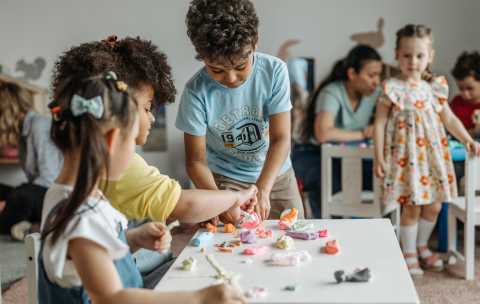All Levels
Adolescents’ Mental Health – Episode 3 – Who Am I? Identity, Peer Pressure & Social Media
₹0.00
Adolescents’ Mental Health – Episode 3 – Who Am I? Identity, Peer Pressure & Social Media
What you'll learn
How identity and self-esteem develop in teens
The impact of likes, filters, and comparisons on self-worth
Positive peer support vs. negative peer pressure
Helping teens build authentic confidence and values
All Levels
Adolescents’ Mental Health – Episode 2- Wired but Tired: The Impact of Screen Time and Sleep on Teen Brains
₹0.00
Adolescents’ Mental Health – Episode 2- Wired but Tired: The Impact of Screen Time and Sleep on Teen Brains
What you'll learn
The neuroscience behind screens, dopamine, and addiction
How disrupted sleep affects academic and emotional performance
Healthy digital habits and tech boundaries
Building a teen-friendly sleep hygiene routine
The Science of Drawing in Children: A Window Into the Developing Mind
What you'll learn
Understand the developmental stages of children's drawings and what they reveal about cognitive and emotional growth.
Recognize how drawing supports brain development, including fine motor skills, spatial awareness, and visual thinking.
Interpret children’s drawings sensitively, gaining insights into their feelings, thoughts, and experiences.
Use drawing as a tool for learning and emotional expression in classrooms and at home.
Apply creative strategies to encourage artistic confidence without overcorrecting or limiting imagination.
Strategies to Improve Participation in Your Virtual Classroom
What you'll learn
Understand key barriers to participation in virtual classrooms and how to address them.
Apply interactive techniques such as polls, breakout rooms, and gamification to boost student engagement.
Use digital tools and platforms effectively to promote active learning.
Build a positive online classroom culture that supports student confidence and contribution.
Design lessons that are student-centered, participatory, and responsive to diverse learning needs.
The Case Against Zeros in Grading: Rethinking Assessment for Student Growth
What you'll learn
Understand the academic and psychological impact of assigning zeros in grading.
Examine the limitations of traditional percentage-based grading systems.
Explore alternative approaches such as minimum grading, standards-based grading, and redo policies.
Learn how to maintain academic rigor while fostering responsibility and resilience.
Develop grading practices that are both fair and focused on long-term student learning outcomes.
Beyond Labels: Embracing Neurodiversity in the Classroom
What you'll learn
Understand the concept of neurodiversity and how it differs from traditional views of disability.
Identify common neurodiverse profiles such as autism, ADHD, dyslexia, and sensory processing differences.
Recognize the strengths and challenges neurodiverse students bring to the classroom.
Learn inclusive teaching practices that support engagement, flexibility, and participation.
Build a classroom culture rooted in empathy, respect, and equity for all learners.
What’s the Right Amount of Homework? Rethinking Homework for Healthy Learning.
What you'll learn
Current research on homework effectiveness and how it varies by age and subject.
The impact of excessive or poorly designed homework on mental health, family life, and motivation.
Guidelines for assigning developmentally appropriate homework that supports mastery and independence.
How to create a healthy home learning environment and partner with families.
Strategies for making homework purposeful—focused on quality over quantity.
All Levels
Adolescents’ Mental Health – Episode 1- The Silent Struggle: Understanding Adolescent Anxiety and Depression
₹0.00
Adolescents’ Mental Health – Episode 1- The Silent Struggle: Understanding Adolescent Anxiety and Depression
What you'll learn
Recognizing emotional red flags and behavioral changes
Differentiating normal teen mood swings from clinical concerns
Ways to create safe, judgment-free spaces for expression
When and how to seek professional help
Teacher-Student Relationship Building
What you'll learn
The science behind teacher-student relationships and their influence on motivation, behavior, and academic outcomes.
Practical communication strategies to build trust, manage conflict, and enhance classroom rapport.
Culturally responsive relationship-building techniques that respect student diversity and individuality.
How to create emotionally safe and inclusive classroom spaces that support belonging and student voice.
Reflective practices for understanding personal teaching style and its impact on student connection.
Inclusive Classrooms: Teaching Strategies That Work for Every Child
What you'll learn
Understand the core principles of inclusive education and why it benefits all students.
Explore practical strategies for differentiating instruction across content, process, and assessment.
Discover how to apply Universal Design for Learning (UDL) to plan inclusive lessons.
Learn classroom management techniques that support diverse learners without stigma.
Gain confidence in creating a classroom environment that nurtures empathy, cooperation, and student voice.
Understanding Genes: What Every Parent Should Know
What you'll learn
Understand what genes are and how they influence traits, growth, and development.
Learn the difference between inherited traits, mutations, and genetic disorders.
Gain insight into how genetics may play a role in learning disabilities, behavioral traits, and medical conditions.
Explore when and why genetic testing may be recommended for children.
Learn how to support children with genetic conditions or learning differences with confidence and care.
Appreciating Teachers: The Heart of Education
What you'll learn
Understand the evolving role and multifaceted responsibilities of teachers in the 21st century.
Reflect on the emotional and social impact teachers have on student lives and learning communities.
Explore global best practices for supporting teacher well-being and professional growth.
Learn ways to create a culture of appreciation within schools and communities.
Be inspired to advocate for teacher recognition, respect, and long-term empowerment.














